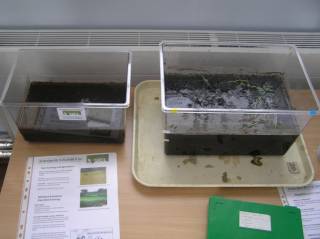Because rice is one of the world's great staple foods, and eaten regularly in Britain, especially by many of London's ethnic minorities, the origins and history of rice agriculture and its implication for past cultural modification of the environment is expected to be of great interest to the public at large. It is therefore expected that this project will have great potential for developing outreach to the general public, especially including Asian minority groups, about the role of Science-Based archaeology in contributing to knowledge about the human past and human-environment interactions in the long term and especially in Asia. This research has great potential in education, especially in A-level courses, as the focus for projects in Geography, Biology or Archaeology.
This project highlights the unique role that rice has played in our development as humans. Below are some examples of subjects that can be explored through this research:
- The anatomy of rice and plant morphology (poster: JPEG)
- Variations on rice farming from upland dry to wet paddy farming and why they developed
- Diagnostic features of modern traditional rice farming and socio-cultural traits
- Reconstructing the environmental record through rice and what evidence archaeologists use - an introduction to phytoliths, diatoms, and lab-based practices
- Comparing current agriculture to that of the archaeological record
- Social development as a result of rice agriculture and domestication in Asia
- Methane emissions and greenhouse gasses in prehistory and how widespread rice domestication and agriculture affected the climate during the Neolithic
- How will rice agriculture affect climate change and greenhouse gasses now and are there methods to mitigate this?
Some educational Resources
- Poster of Phytoliths (JPEG)
- Map of wild rice distribution and domestication areas (JPG)
- Map of Rice Domestication in China (JPEG) (PDF)
- Map of early rice in India (JPEG)
- Article summarizing the Early Rice Project (from 2011) (pdf)
Suggestions for growing your own mini-paddy
- How to Build your own Paddy Field Activity [pdf]

A-Level Students:
Interdisciplinary science-based projects are a perfect tool for communicating the human past and showing a broad range of environmental and social indicators. The Early Rice Project is a unique example showing the breadth of information that you can uncover by looking at our global staple food, and the range of impacts its development has had on humans throughout time.
At the forefront of this project is the unique application of our findings to one of the most pressing current issues - climate change. From studies on rice we can re-construct global warming dating back as far as 7000BP through methane emissions from wet rice farming. The Early Rice Project provides tools for us to track the relationship between greenhouse gas emission and the spread of rice agriculture while looking at the impact on current climate change, overpopulation and hunger.
Further to developing the archaeological record by broadening our understanding of climate, and the agricultural systems on which we depend, this project highlights the importance of the world's staple crop, rice. With over half the world dependent upon it for their nutrition, the balance between human development and our understanding of this remarkable plant has far reaching importance to current world hunger, cultural behaviour, population control and economy. The application of geographical issues to the subject is pronounced, and allows a contentious crossover of the two disciplines on a global scale.
This project provides a unique opportunity to incorporate all of these issues into the curriculums for Geography, Biology, Archaeology, and Environmental Science. Over the course of the project we will be compiling academic resources and a number of school specific fliers, learning tools and toolkits. In addition we will be hosting a dedicated website on the history of rice and agriculture and the full scope of the Early Rice Project. This will house resources for students to get involved with the project and provide a portal for archaeobotanical research.
If you are interested in archaeobotanical research in general.
- Archaeobotany at the Institute of Archaeology
- On-line guide and photo gallery on field sampling by flotation.
- Recent news in rice domestication research (on scoop.it)
- Recent news in archaeobotany and domestication research (on scoop.it)
- Recent new in Chinese archaeology (on scoop.it)
- Downloads for archaeobotanical research and specialist teaching, and further links
 Close
Close

